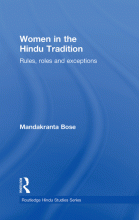Women in the Hindu Tradition: Rules, Roles and Exceptions

This book accounts for the origin and evolution of the nature and roles of women within the Hindu belief system. It explains how the idea of the goddess has been derived from Hindu philosophical ideas and texts of codes of conduct and how particular models of conduct for mortal women have been created. Hindu religious culture correlates philosophical speculation and social imperatives to situate femininity on a continuum from divine to mortal existence. This creates in the Hindu consciousness multiple - often contradictory - images of women, both as wielders and subjects of authority. The conception and evolution of the major Hindu goddesses, placed against the judgments passed by texts of Hindu sacred law on women’s nature and duties, illuminate the Hindu discourse on gender, the complexity of which is compounded by the distinctive spirituality of female ascetic poets. Drawing on a wide range of Sanskrit texts, the author explains how the idea of the goddess has been derived from Hindu philosophical ideas and also from the social roles of women as reflected in, and prescribed by, texts of codes of conduct. She examines the idea of female divinity which gave rise to models of conduct for mortal women. Instead of a one-way order of ideological derivation, the author argues that there is constant traffic between both ways the notional and the actual feminine. This book brings together for the first time a wide range of material and offers fresh stimulating interpretations of women in the Hindu Tradition.
